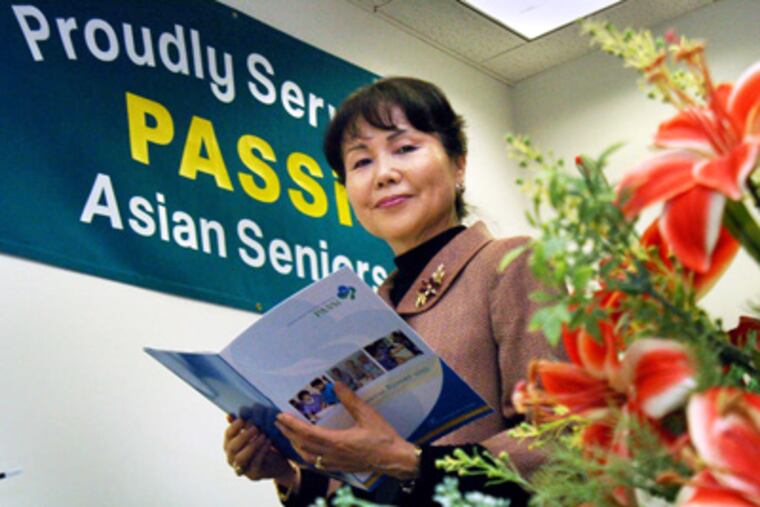Health care with all the comforts of home
AFTER Im Ja Choi's mother spent months in and out of a hospital with stomach cancer in 2002 at age 85, doctors told Choi it would be best if her mother was in a nursing home.

AFTER Im Ja Choi's mother spent months in and out of a hospital with stomach cancer in 2002 at age 85, doctors told Choi it would be best if her mother was in a nursing home.
There was nothing more they could do, the doctors said.
But Choi's mother, Boonam Park, who came here from South Korea, wouldn't have fared well in a nursing home.
"She didn't speak English at all," said Choi. "She didn't eat American food. I could not send her to a nursing home."
So, when Park was discharged from the hospital in 2003, "I had no other choice than to take care of her, to bring her home," said Choi.
Choi, who was in between jobs in her financial-services career, stopped looking for a full-time job and devoted herself to care for her mother. But she realized she still needed help. It took her seven months to find a Korean-speaking home health aide.
Then, others in the Korean community contacted Choi. "Where can I find [someone like] her, someone who speaks Korean?" they asked Choi.
In 2004, Choi opened Korean American Senior Services of Pennsylvania to train and provide Korean-speaking home health aides to those in the immigrant community.
She soon found out that the need was even greater - there wasn't an agency that could provide home health aides who spoke other Asian languages.
So, in late 2005, her agency expanded to become Penn Asian Senior Services, for which Choi is the executive director. Based in Jenkintown, it now trains and provides home health aides who can speak eight languages: Korean, Mandarin, Cantonese, Vietnamese, Khmer (the Cambodian language), Indonesian, Filipino and English.
Choi says her agency now serves 248 clients in Philadelphia, Montgomery, Delaware, Chester and Bucks counties and employs about 250 home health aides.
Most clients are Asian immigrants, but the agency also serves non-Asian clients. Many people are referred by the Philadelphia Corporation for Aging, Choi said.
Choi, 63, who came to this country from Korea in 1971 after being hired by a trading company, was one of 10 people nationwide recently awarded $125,000 by the Robert Wood Johnson Foundation for improving health care in underserved populations.
She is considering using that money to set up a day-care center for seniors - "even though they are homebound, they would like to socialize," she said - or to fund research to obtain statistics on Asian seniors.
Choi's mother died last year at age 93. Choi now takes care of her mother-in-law.
Sending elderly parents to nursing homes is not common in Asian families.
"For Asians, we are usually the ones who take care of elderly people," said Choi. "Going to a nursing home is not welcomed by Asians."
Having a home health aide who speaks the patient's language and is from the patient's culture enables the seniors to stay at home, in their comfy environs.
"Most of our frail seniors want to eat their ethnic meals," said Choi. "They don't like burgers."
In addition to cooking meals for the patients, the home health aides do light cleaning, help the seniors bathe and exercise, and remind them to take their pills.
Lois Hayman-El, a training specialist at the Philadelphia Corporation for Aging who works closely with Choi, said Choi was on the vanguard of health-care patients' cultural needs.
Choi found a way to keep home health services "within the community where someone speaks the language and would be of the culture," Hayman-El said.
In some cases, the home health aides employed by Choi are family members of the clients.
Keling Zhong, 50, is one of the aides employed by Penn Asian Senior Services. She takes care of her mother-in-law, Muoi Dang, 76, in their Elkins Park home. They hail from Guangdong province in southeastern China.
Dang, who speaks Cantonese and a little Mandarin but no English, suffers bone loss from osteoporosis and can't walk without the help of a cane or walker.
Part of her days, she sits in a soft reclining chair in the family's living room, watching Cantonese- or Mandarin-language programs on the large TV screen. Two or three times a day, Zhong helps her get up to take short walks to the other side of the living room to get some exercise. Dang will sit by the large living-room window, looking out at the leafy, suburban residential street.
"She looks outside so she won't be that bored," Zhong said, speaking in Mandarin.
Zhong cooks for her mother-in-law, helps her in and out of the tub and reminds her to take her pills. She receives $10.50 an hour, or about $440 a week, for her work with the agency. She initially had to undergo 80 hours of training to be certified as a home health aide.
Phoi Troutman, the agency's outreach coordinator for Mandarin, Cantonese and Vietnamese clients, said the training involves the basics on how to care for patients. "A lot of people don't want a stranger to come to their house," she said. "The bottom line is it's hard to find people. Sometimes, we send an aide, and [the client] is not happy. They don't want people to know their family's medical thing."
Before Zhong became her mother-in-law's home health aide, another woman from Penn Asian Senior Services came to help Dang for about a year. This was helpful, especially when Zhong went back to China to visit relatives.
"This agency, whatever language you need, they can help you," she said.